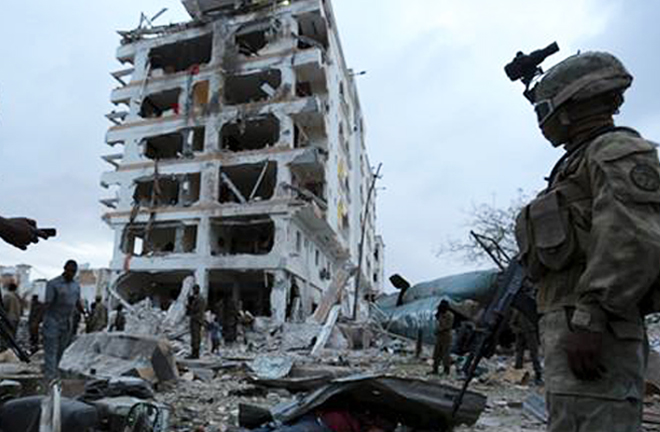Vacuum of power, aid from al-Qaeda fuel rise of al-Shabab

A soldier patrols the Jazeera Palace hotel in Somali capital Mogadishu which was attacked by al-Shabab on July 26.
On July 26, terrorists detonated a bomb at a hotel in the Somali capital Mogadishu, killing at least 13 people and injuring more than 40 others. A security guard at China's embassy was killed and three embassy staff members wounded. It is another outrageous attack committed by the extremist group al-Shabab, which had previously killed 60 people at a shopping center in the Kenyan capital Nairobi in 2013.
In the shock and grief of the aftermath, many are left wondering the reason behind al-Shabab’s resurgence and why the Chinese embassy chose to locate its headquarters in this hotel.
In 1991, civil war broke out in Somalia, and the Siad Barre regime was ousted, turning Mogadishu into a battlefield plagued by gunfire, bomb blasts, looting and arson.
Since then, Somalia has deteriorated into a warzone as warlords and militias vie for power in the vacuum. The international community has managed to convene 13 peace talks without reaching consensus among the belligerent parties. In the 14th attempt to restore order, a new transitional parliament was inaugurated in October 2002 in Kenya and Abdullahi Yusuf was elected president.
In 2012, Somalia’s first formal parliament in more than 20 years was sworn in at Mogadishu airport. Later, academic and civic activist Hassan Sheikh Mohamud was elected president. However, the chaos remains, and the government can barely control the capital, let alone the entire nation.
In 2014, China reopened its embassy in Somalia in the Jazeera Palace hotel, which was believed to be the safest area, but the attack came unexpectedly.
In the war-torn state, a number of warlords and militias coexist, and the main resistance to the government was led by the Islamic Courts Union (ICU). With the dissolution of the ICU following the invasion of Somalia by the locally-reviled Ethiopian military, al-Shabab, a subordinate of ICU, arose as the most competent and capable resistance force against the Ethiopian occupation. It once took control of most of the territories, including part of the capital.
Seeking to create a religious state ruled according to their radical interpretation of Sunni Islam, al-Shabab has declared jihad against “enemies of Islam” and refuses to reconcile with the government, posing the greatest threat to Somalia and neighboring states. Right now, it is the main target of Somali security forces and the African Union Mission to Somalia.
Al-Shabab’s growing strength and militancy can be attributed to the following four reasons.
First, the failure of the state and subsequent competition among warlords and militias for influence and resources has paved the way for the rise of al-Shabab. Since the civil war in 1991, Somalia underwent three major phases. Somalia has been without a functioning central government from 1991 to 2004, and then it underwent an eight-year transitional period from 2004 to 2012.
In 2012, under its first formal parliament, Somalia entered a new phase. However, the constant fighting has displaced millions of Somalis, and the ordinary people are struggling to stay alive.
In turn this state of affairs created widespread hopelessness among the youth. Unemployment among the youth has left them vulnerable to manipulation by elites who are pursuing self-interest by unlawful means. Some join al-Shabab, while others become pirates.
Next, clan enmity, collective punishment and adverse antagonistic features of Somali culture reward violence. The horn of Africa is also constantly plagued by drought.
Ioan Lewis, a well-know British scholar in Somali studies, wrote in his book A Modern History of the Somali that “The nomadic Somali are a warlike people, driven by the poverty of their resources to intense competition for access to water and grazing.”
In addition, they carry on the tradition of blood feuds. At times, a conflict between clans starts over a mere expression of hostility. One clan may kill a member of another clan merely because the victim’s clansmen have killed an individual from their own. As a result, it is not hard to understand that the attack in Mogadishu was another retaliation in response to assaults by African Union forces and the Somali government.
Third, the ambivalence and military weakness of the international community offer further encouragement to al-Shabab.
The international community has widely expressed determination to combat the violent extremist group. In 2008, it was designated as a terrorist organization by the US, but tormented by “Somalia syndrome,” the US could not spare any resources. The United Kingdom and Italy, as the former colonial patrons of Somalia, remained silent. Members of the League of Arab States oppose foreign interference in the internal affairs of Somalia, complaining about the external forces fighting against the ICU. Kenya and Ethiopia have sent troops to Somalia, and so has the African Union Mission to Somalia, but due to limited human, financial and material resources, the overall outcome has been far from satisfactory.
Finally, its connections to al-Qaeda have equipped the splinter group with abundant expertise and funding, which is the objective condition for its existence. It pledged allegiance to the militant Islamist organization al-Qaeda in February 2012, enlarging its recruitment, mobility and funding inflow, which is why it can plot attacks in Somalia and neighboring countries.
Long Yuan is a reporter at the Chinese Social Sciences Today.

 PRINT
PRINT CLOSE
CLOSE